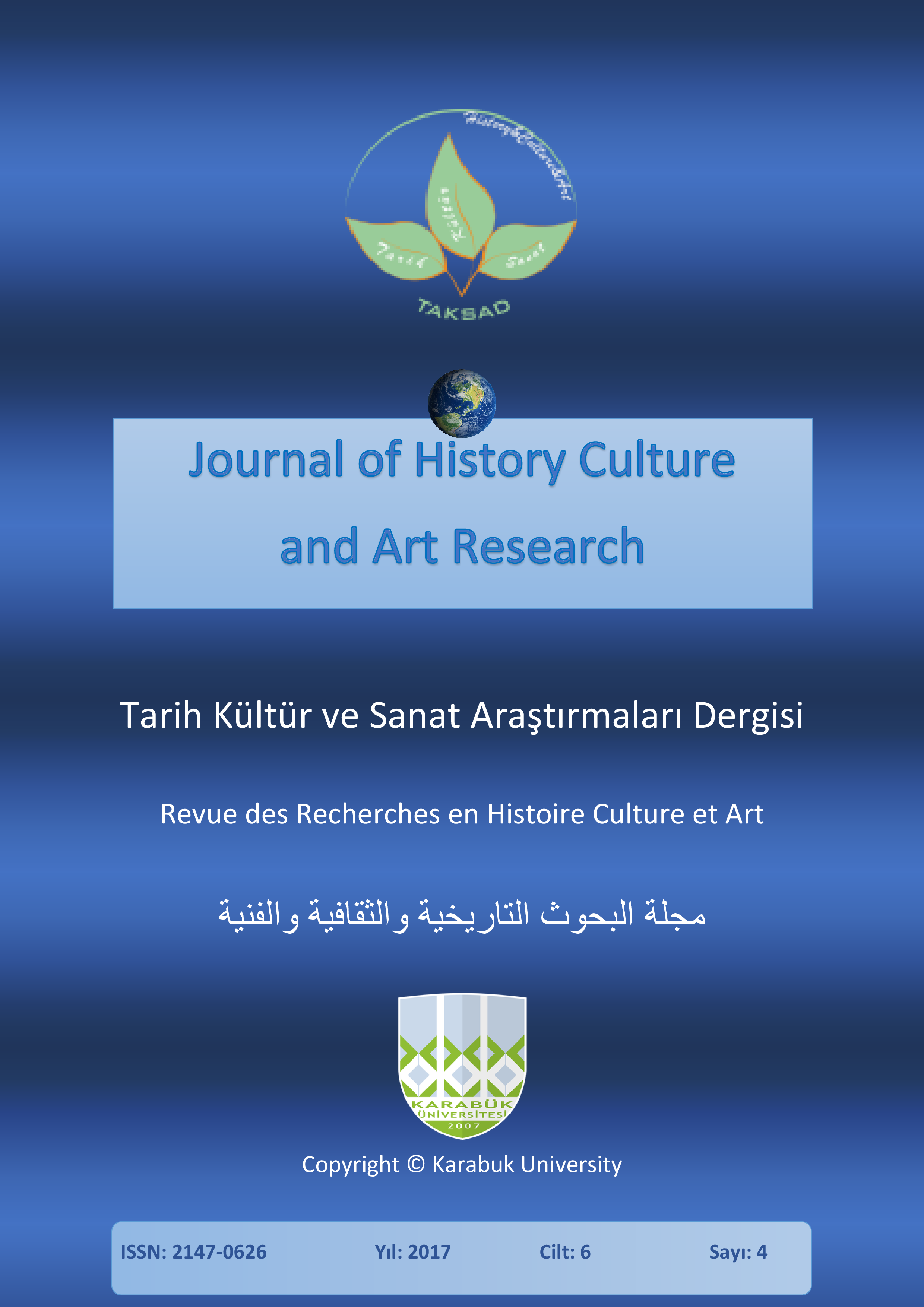John Brown as an Independent Character from Warburton Circle / Warburton Camiası’ndan Bağımsız Bir Karakter Olarak John Brown
DOI:
https://doi.org/10.7596/taksad.v6i4.1037Keywords:
John Brown, 18. Yüzyıl, İngiliz aydınlanması, Warburton camiası, Reform planları, Eighteenth-century, English enlightenment, Warburton circle, Reform strategies.Abstract
Abstract
John Brown (1715-1766) and William Warburton (1698-1779) were two leading characters of the English Enlightenment. The enlightenment associated with their works could provide a political, social and intellectual situation of eighteenth century Britain. Therefore, they are worthy of attention. Britain became a trans-oceanic commercial and colonial power in the first half of the century and thus the growth of commercial society and empire changed the character of the nation. Warburton’s works were presenting a complicated programme for reform. Warburton and also his party (Warburton circle) aimed to preserve the Great Britain from the effects of intolerance, superstition, religious enthusiasm and religious division. They aimed to maintain the Anglican establishment. Brown who was considered as a loyal member of Warburton circle, regardless their fall out later, introduced reform strategies for the eighteenth century Britain like other members. In this paper it is indicated that Brown was developing a different reform agenda to that of William Warburton. I argue that the Brown’s main work “An Estimate of the Manners and Principles of The Times” (1757) can actually be read as a refutation of Warburton’s thoughts and of the reform strategies developed by members of his circle and thus Brown need to be considered as a self-directed political reformist.
Öz
John Brown (1715-1766) ve William Warburton (1698-1779) İngiliz Aydınlaması’nın en önemli karakterlerindendir. Her ikisinin de yapıtları 18. yüzyıl İngilteresi’nin siyasi, sosyal ve entellektüel durumunu ve dolayısı ile İngiliz Aydınlanması’nı bize gösterdikleri için, çalışmaya değerdir. Britanya 18. yüzyılın ilk yarısında okyanus aşırı ticari bir güç ve bir sömürge imparatorluğu olduğu için, ulusun karakteri değişikliğe uğramıştır. Bu sebepten Warburton, eserleri aracılığı ile İngiltere için ulusal bir reform program sunar. O ve onun akımını takip edenler (Warburton camiası) Büyük Britanya’yı hoşgörüsüzlük, batıl inanç, dini fanatizm ve dinsel uzlaşmazlığın etkilerinden korumayı ve Anglikan düzeni korumayı amaçlarlar. Warburton camiası’nın sadık bir üyesi olan Brown, sonradan bu camiadan ayrılmış olsa da Warburton’u takip eden diğer bireyler gibi dönemin İngilteresi için reform stratejileri önermiştir. Bu çalışmada, Brown’un Warburton’dan daha farklı bir reform program sunduğu gösterilmiştir. İddiam şudur ki, Brown’un esas çalışması olan “Dönemin İlke ve Davranışlarına Dair bir Tahmin- An Estimate of the Manners and Principles of The Times (1757) adlı eseri Warburton’un ve onun camiasının düşüncelerini ve reform programlarını çürütme niteliğinde bir yazı olarak okunabilir. Bu yüzden Brown bağımsız bir siyasi reformist olarak değerlendirilmelidir.
References
Anonymous. (1772). Letters Concerning The Present State Of England: Particularly Respecting The Politics, Arts, Manners, and Literature Of The Times, London.
Brown, John (1745). An Essay on Satire: Occasion’d by the Death of Mr. Pope, London.
Brown, John (1757). An Estimate of the Manners and Principles of the Times, London.
Brown, John (1751). Essays on the Characteristics, London.
Brown, John (1743). Honour: A Poem, London.
Brown, John (1749). On Liberty: A Poem, London.
Brown, John (1753). On the Use and Abuse of Externals in Religion, London.
Brown, John (1753). On the Use and Abuse of Externals in Religion, London.
Brown, John (1764). Sermons on Various Subjects, London.
Brown, John (1746). The Mutual Connexion between Religious Truth and Civil Freedom; between Superstition, Tyranny, Irreligion, and Licentiousness, London.
Crimmins, James E. (2004). ‘Brown, John (1715–1766)’, in Oxford Dictionary of National Biography, edited by H. C. G. Matthew and Brian Harrison (Oxford University Press, 2004).
During, Simon (n.d.). “Church, State and Modernization: English Literature as Gentlemanly Knowledge after 1688”, MUSE, pp.167-196.
Eddy, Donald D. (1971). A Bibliography of John Brown, New York.
Evans, Arthur William (1932). Warburton and the Warburtonians: a study in some eighteenth-century controversies, O. U. P.
Garrick, David (1832). The private correspondence of David Garrick: with the most celebrated persons of his time (Colburn and Bentley, 1832).
Green, Thomas (1810). Extracts from the Diary of a Lover of Literature, Ipswich.
Holmes, Geoffrey S. (1982). Augustan England: Professions, State and Society, 1680-1730, London: Allen and Unwin.
Nichols, John (1812). Literary Anecdotes of the eighteenth century, six vols, (London, 1812), vol. V.
Pope, Alexander (1751). The Works of Alexander Pope, in Nine Volumes complete, with his last corrections, additions, and improvements, together with all his Notes, published by William Warburton, with occasional Notes, London.
Warburton, William (1789). “A Critical and Philosophical Enquiry into the Causes of Prodigies and Miracles, as related by Historians” in Tracts by Warburton, and a Warburtonian, London.
Warburton, William (1745). A Sermon Occasioned by the Present Unnatural Rebellion. Being an Earnest Exhortation to a manly defence of our Happy Constitution in Church and State, London.
Warburton, William (1746). A Sermon Preached on the Thanksgiving for the Suppression of the Late Unnatural Rebellion, London.
Warburton, William (1809). Letters from a late eminent prelate to one of his friends, London, 1809.
Warburton, William (1736). The Alliance between Church and State, London.
Warburton, William (1788). The Works of the Right Reverend William Warburton, edited by Richard Hurd, Vol.I-VII, London.
Downloads
Published
How to Cite
Issue
Section
License
All papers licensed under Creative Commons 4.0 CC-BY.- Share — copy and redistribute the material in any medium or format
- Adapt — remix, transform, and build upon the material for any purpose, even commercially.
Under the following terms:
Attribution — You must give appropriate credit, provide a link to the license, and indicate if changes were made. You may do so in any reasonable manner, but not in any way that suggests the licensor endorses you or your use.
- No additional restrictions — You may not apply legal terms or technological measures that legally restrict others from doing anything the license permits.







